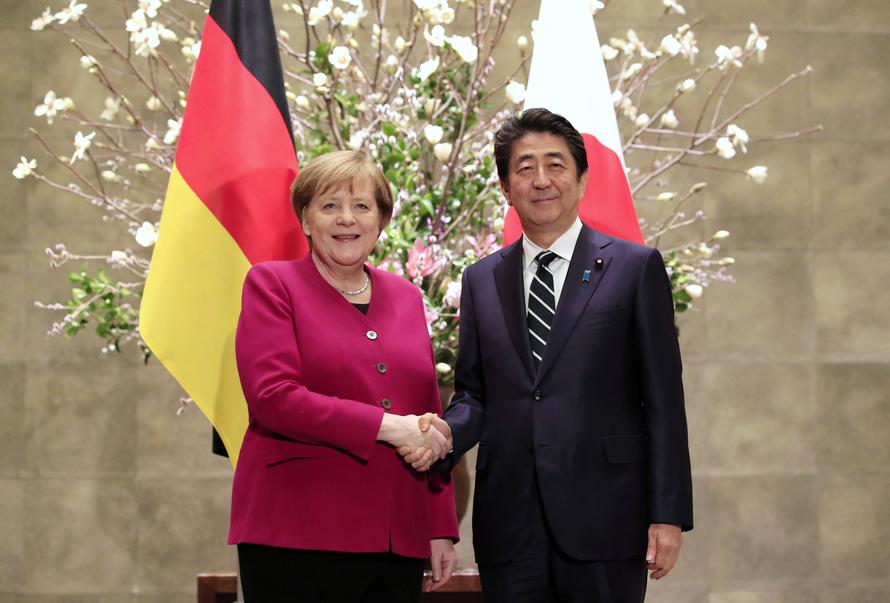Authored by Andrew Korybko via Oriental Review,
Prime Minister Abe hosted Chancellor Merkel earlier this week and committed to enhancing what he described as the “alliance of multilateralists” that exists between their countries and especially them personally.
These two Great Powers are against Trump’s “America First” ideology of prioritizing his country’s interests in all foreign policy and economic decisions instead of proverbially “taking one for the team” and sacrificing the US’ interests for the so-called “greater good” of its supposed “allies” and the rest of the world. Abe and Merkel, however, are Liberal-Globalists who are ideologically opposed to Trump’s Hyper-Realist view of International Relations, which explains why they’re joining forces to thwart his global ambitions.
There are obvious limitations to what these two US-occupied countries can really do in this respect, but the fact that they signed a recent “Economic Partnership Agreement” (EPA) with one another that gives Germany and the rest of the EU a foothold in last year’s Japanese-led “Comprehensive and Progressive Agreement for Trans-Pacific Partnership” (CPTPP, or basically the TPP minus the US) shows just how much they’re willing to defy the economic dimensions of Trump’s “America First” vision. As for the geopolitical ones, Germany is proudly moving ahead with Nord Stream II despite fierce American resistance while Japan is engaged in talks with Russia over finally signing a peace treaty to end World War II.
Furthermore, the German-led initiative to create a so-called “European Army” and Japan’s simmering disputes with South Korea speak to the fact that the US is somewhat losing control over its junior partners, or rather, no longer has the same amount of total control over them as it used to have and therefore has to flexibly adapt to these changing conditions via the “Lead From Behind” stratagem of outsourcing regional leadership responsibilities to like-minded partners. Even under those conditions, however, both Great Powers can try to use their deepening partnerships with one another and the shared potential between them as leverage in their individual relations with the US.
The US still has the economic and geopolitical upper hand over each of them because of just how dependent they are on the American marketplace and hopelessly unable to remove the American military presence in their countries, though Washington might be pressured into “compromising” with them on some trade issues if they play their cards wisely as a team. For example, both of them are expanding their Silk Road relations with China, which could be interpreted by America as being to its zero-sum disadvantage unless it cuts better deals with Germany and Japan to stop its rival from replacing its market importance to their economies.
German Chancellor Angela Merkel, left, is welcomed by Japanese Prime Minister Shinzo Abe upon her arrival at Abe’s official residence in Tokyo, Japan, February 4, 2019.
At the same time, however, Trump might be so enraged at this strategic affront that he doubles down on partnering with their regional rivals, which in this case are Poland and South Korea. Warsaw wants to lead the “Three Seas Initiative” of Central & Eastern European states, while Seoul has proven itself to be a reliable American ally unwilling to “rock the boat” too much even during times when it and Washington disagree. The US might therefore seek to “reward” them for their “loyalty” with preferential geopolitical favors in the case of Poland and economic ones when it comes to South Korea.
As such, the Japanese-German alliance might backfire on those Great Powers if Trump decides to punish them instead of patiently try to strike a pragmatic deal with them instead. Their freedom of strategic maneuverability is already largely limited as it is, and the US’ support of their regional rivals could make matters even more complicated for them. The US would never allow either of them to call upon Russia or China for additional support to the extent that might be needed even in the unlikely event that they requested it, though they might nevertheless still be able to creatively leverage their strategic partnership to some constructive end or another.
via ZeroHedge News http://bit.ly/2RUjTHM Tyler Durden
